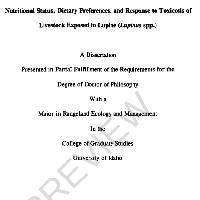Resumen
-
This research examined the effect of nutritional status on the feeding behavior of domestic sheep and cattle exposed to lupine (Lupinus spp.), a large genus of alkaloid-containing plants that are toxic to livestock. A series of pen and grazing studies were conducted from 2000 to 2002, to study how body condition, supplementation, and hunger affect ingestion of lupines and changes in dietary preferences of sheep and cattle after exposure to lupines. We also studied how body condition influences the consumption of lupine in a rangeland setting and disposition of alkaloids in serum after ingestion.
In a series of pen studies, creating a mild state of hunger by restricting intake of dry matter in the basal diet did not change the amount o f dry lupine foliage ingested by the ewes. Similarly, body condition or supplement availability also did not affect intake of lupine. When a dose of ground lupine was delivered directly to the rumen, a mild and short-lived aversion was produced to a novel food. But, preference for familiar feeds containing higher or lower crude protein did not change. A ruminal dose of ground lupine given to ewes in low (LBC) and average body condition (ABC) to test response to toxicosis, revealed that ewes in LBC, regardless of supplementation, experienced higher alkaloid concentrations in serum suggesting a reduced capacity to metabolize lupine alkaloids.
In a grazing experiment, body condition affected the lupine intake by grazing cattle and lupine consumption was negatively associated with availability of more desirable forages. Cows in low body condition (LBC) started eating lupine earlier in the grazing trial and reached higher maximum intakes of lupine than cows in high body condition (HBC). Furthermore, cows in LBC increased lupine ingestion more readily when other forages decreased in the pasture than HBC cows.
Our findings from penned studies using dry lupines do not support the common belief that hungry or LBC animals are more likely to eat poisonous plants. However, our study performed in grazing conditions suggests that animals in LBC are more likely to consume greater amounts of lupine. Furthermore, these animals may have lower capacity to metabolize alkaloids from lupines.
